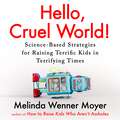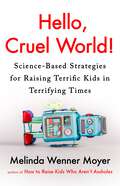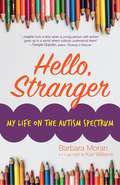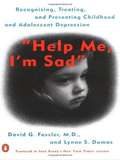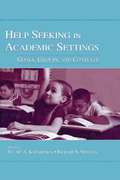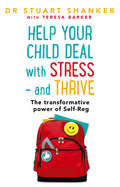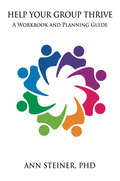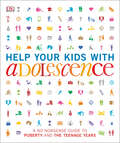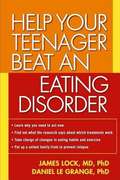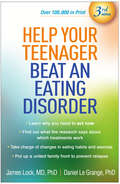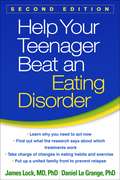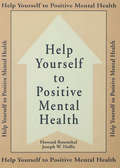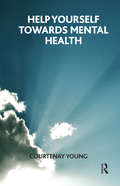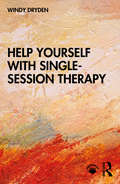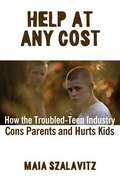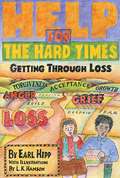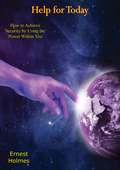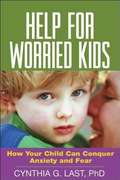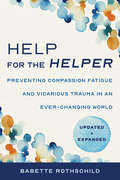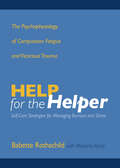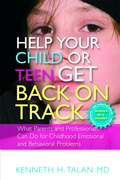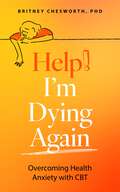- Table View
- List View
Hello, Cruel World!: Science-Based Strategies for Raising Terrific Kids in Terrifying Times
by Melinda Wenner MoyerParents today are terrified on behalf of their kids, and for good reason. In the blink of an eye, our kids will be adults facing more serious threats than we ever did - climate change, gun violence, political polarization, and disinformation, to name a few. We're not going to be able to solve all the intractable problems of the world before our kids grow up - so how are we to prepare them for an impossibly complex and scary future?Award-winning science journalist Melinda Wenner Moyer battled insomnia night after night, her thoughts spiraling around this exact question. So she decided to do what she does best - learn from parenting experts and find the solution. Just as she did in her breakout book, How to Raise Kids Who Aren't Assholes, Moyer again interviewed researchers across multiple fields - psychology, education, information literacy, business, and even addiction. What she discovered: even in a world full of assholes, we can still teach our kids how to take care of themselves, fight for what they believe in, manage uncertain times, and even bridge divides most adults aren't equipped to do.In Hello, Cruel World!, Moyer provides practical, comprehensive, science-backed tools to help our children handle the world they will inherit. By using the three core attributes children need to succeed in our flawed world - coping mechanisms, connection techniques, and cultivation practices - our kids can learn to set boundaries, take responsibility for their actions, build healthy relationships in turbulent times, and much more. By being activists in our parenting, we can set our kids up to not just survive, but also make a better world for themselves and future generations.
Hello, Cruel World!: Science-Based Strategies for Raising Terrific Kids in Terrifying Times
by Melinda Wenner MoyerParents today are terrified on behalf of their kids, and for good reason. In the blink of an eye, our kids will be adults facing more serious threats than we ever did - climate change, gun violence, political polarization, and disinformation, to name a few. We're not going to be able to solve all the intractable problems of the world before our kids grow up - so how are we to prepare them for an impossibly complex and scary future?Award-winning science journalist Melinda Wenner Moyer battled insomnia night after night, her thoughts spiraling around this exact question. So she decided to do what she does best - learn from parenting experts and find the solution. Just as she did in her breakout book, How to Raise Kids Who Aren't Assholes, Moyer again interviewed researchers across multiple fields - psychology, education, information literacy, business, and even addiction. What she discovered: even in a world full of assholes, we can still teach our kids how to take care of themselves, fight for what they believe in, manage uncertain times, and even bridge divides most adults aren't equipped to do.In Hello, Cruel World!, Moyer provides practical, comprehensive, science-backed tools to help our children handle the world they will inherit. By using the three core attributes children need to succeed in our flawed world - coping mechanisms, connection techniques, and cultivation practices - our kids can learn to set boundaries, take responsibility for their actions, build healthy relationships in turbulent times, and much more. By being activists in our parenting, we can set our kids up to not just survive, but also make a better world for themselves and future generations.
Hello, Stranger: My Life on the Autism Spectrum
by Barbara Moran Karl Williams“…Insights from a time when a young person with autism grew up in a world where nobody understood them!” – Temple Grandin, author, Thinking in PicturesBarbara Moran has never known how to be good.As a child, she made strange noises, fidgeted constantly, and licked her lips until they cracked. She had “upsets” that embarrassed and frustrated her family. Worse still, she developed friendships with inanimate objects—everything from roller skates to tables to an antique refrigerator—and became obsessed with images of cathedrals.She was institutionalized, analyzed, and marginalized, cast aside as not trying hard enough to fit in.But after almost forty years, Barbara was given an answer for her inability to be like, and to connect with, other people: autism.Hello, Stranger is the story of a misunderstood life that serves as an eye-opening call for compassion. Bracingly honest, Barbara describes the profound loneliness of being abandoned and judged while also expressing her deep yearning simply to be loved and to give love.Hello, Stranger is a challenge to every reader to see the beauty and the humanity present in every individual.“An extraordinary look at autism from the inside – by turns heartbreaking, uplifting, illuminating, witty, and wise.” – Steve Silberman, author, NeuroTribes: The Legacy of Autism and the Future of Neurodiversity
Help Me Say Goodbye: Activities for Helping Kids Cope When a Special Person Dies
by Janis SilvermanAn art therapy and activity book for children coping with death. Sensitive exercises address all the questions children may have during this emotional and troubling crisis. Children are encouraged to express in pictures what they are often incapable of expressing in words.
Help Me, I'm Sad
by David G. Fassler'One time I was so sad I wished I would go to sleep and not wake up. ' Seven-year-old Dana is just one example, in this wise and enlightening book, of a child with a disease that did not officially exist until 1980. Today, the National Institute of Mental Health estimates that 2. 5% of all youngsters under eighteen have crossed the line between normal sadness and clinical depression'at earlier and earlier ages. Moreover, research shows that such childhood depression is highly predictive of adult problems. 'Help Me, I'm Sad? explains with wisdom and empathy how parents can play a vital role in helping a child overcome, and often prevent, depression. It discusses how to tell if your child is at risk; how to spot symptoms; depression's link with other problems and its impact on the family; teen suicide; finding the right diagnosis, therapist, and treatment; and what you can do to help. Above all, it reveals how to avoid depression by building a child's emotional adaptability. For parents who have'or suspect they may have'depressed children, here is a mine of practical, easy-to-understand information.
Help Seeking in Academic Settings: Goals, Groups, and Contexts
by Richard S. Newman Stuart A. KarabenickBuilding on Karabenick’s earlier volume on this topic and maintaining its high standards of scholarship and intellectual rigor, Help Seeking in Academic Settings: Goals, Groups, and Contexts brings together contemporary work that is theoretically as well as practically important. It highlights current trends in the area and gives expanded attention to applications to teaching and learning. The contributors represent an internationally recognized group of scholars and researchers who provide depth of analysis and breadth of coverage. Help seeking is currently considered an important learning strategy that is linked to students’ achievement goals and academic performance. This volume not only provides answers to who, why, and when learners seek help, but raises questions for readers to consider for future research. Chapters examine:*help seeking as a self-regulated learning strategy and its relationship to achievement goal theory;*help seeking in collaborative groups;*culture and help seeking in K-12 and college contexts;*help seeking and academic support services (such as academic advising centers);*help seeking in computer-based interactive learning environments;*help seeking in response to peer harassment at school; and*help seeking in non-academic settings such as the workplace. This book is intended for researchers, academic support personnel,and graduate students across the field of educational psychology, particularly those interested in student motivation and self-regulation.
Help Your Child Deal With Stress – and Thrive: The transformative power of Self-Reg
by Stuart ShankerWe are seeing a generation of children and teens with excessively high levels of stress, and, as a result, an explosion of health problems in young people today. But few parents recognise the 'hidden stressors' that their children are struggling with. This book, previously published as Self-Reg, will give you the tools to help you recognise stress and understand your child's behaviour, and teach your stressed, emotional child to identify their 'big' emotions and get back on an even keel by themselves. Stress can affect your child in many ways - whether it's exam pressure, pressure exerted by friends online or in the playground, or related to health, with lack of sleep and anxiety at home contributing. Help Your Child Deal With Stress - and Thrive is a ground-breaking parenting book, in which Dr Stuart Shanker argues that by teaching children the art of self-regulation, it can transform their behaviour and help them to identify, talk about and manage their emotions. This leads to a harmonious home, and children who feel nurtured and supported.Mastering the art of self-regulation can help children learn to deal with experiences, overcome frustration, pay better attention, engage better with others and enhance their learning capabilities. In turn, children will develop the confidence, along with the skills and emotional strength needed to navigate the pressures and stresses of the modern world.Underpinned by science, Dr Shanker's techniques have had a remarkable effect on children and parents alike, and hundreds of thousands of children who have gone through the programme in Canada have shown significant improvement in literacy, numeracy and behaviour. 'In this important and timely book, Stuart Shanker encourages us to see our children in a whole new light and gives us the tools we need to help nurture our young in order that they can better manage stress, build resiliency and improve their emotional health. Today's pupils are under serious pressure to perform; by helping children recognize, identify and talk about their emotions, we can help them find balance and ultimately realise their true potential.' - Sir Anthony Seldon, Vice-Chancellor of the University of Buckingham, co-founder of Action for Happiness and best-selling author
Help Your Group Thrive: A Workbook and Planning Guide
by Ph. D. Ann SteinerThis easy-to-use manual is recommended for leaders of all types of groups - discussion groups, peer support, organizations, and workplace teams. You'll find discussion of the different types of groups, leadership styles and roles. Worksheets help you figure out your preferred leadership style, along with facilitation tools, sample group agreements, online netiquette information, and numerous modifiable written forms for starting and maintaining effective groups. Practical advice and worksheets help you design your group, select potential members, and understand common group challenges. These valuable tools will take you from defining your group's mission to helping your group thrive.
Help Your Kids with Adolescence: A No-Nonsense Guide to Puberty and the Teenage Years (DK Help Your Kids)
by DKDeal with the ups and downs of growing up. This visual guide to puberty and adolescence is a must-read for all parents and tweens embarking on those scary teenage years. This growing up book covers contemporary issues such as internet safety and tackles key topics such as sexuality and body image. Demystify puberty with this must-read home reference ebook. From your menstrual cycle to sexting, and even cyber-bullying.This straightforward, unpatronizing approach to tricky topics is the essential illustrated guide to adolescence for both parents and their teens. The stunning graphics and illustrations make this invaluable for tweens and teens alike.Help Your Kids With Adolescence is a guide for modern kids coming into their teen years. It addresses topical issues like body image, the effects of social media, and sexting. It also offers a biological explanation for the physical side of being a teenager from mood swings, periods, and breaking voices. This ebook offers a no-nonsense, non-judgemental approach to help parents and their kids navigate their way through puberty and adolescence. Sexuality, Confidence, Social Media, Emotions, Stress!Puberty and adolescence can be a confusing and complex time. Help Your Kids With Adolescence offers straightforward advice to help parents and children survive and thrive during the turbulent teenage years. Emotional well-being, physical changes, online safety, family dynamics, relationships, sexuality, and much more are discussed and explained through jargon-free text and simple, clear illustrations. Engaging graphics and illustrations make this modern, comprehensive guide to adolescence invaluable for tweens and teens alike. Whether as a quick-reference guide or cover-to-cover read.This self-understanding and self-development ebook will discuss and explain the following topics:- Growing Up- Female Puberty- Male Puberty- Healthy Body- Healthy Mind- Achieving Potential - Digital Life- Sexuality- Relationships - And more.DK&’s bestselling Help Your Kids With series contains crystal-clear visual breakdowns of important subjects. Simple graphics and jargon-free text are key to making this series a user-friendly resource for frustrated parents who want to help with children get the most out of life. Get help with anything from geography and music to maths, SATs, and growing up.
Help Your Teenager Beat an Eating Disorder
by Daniel Le Grange James LockIf your teenager shows signs of having an eating disorder, you may hope that, with the right mix of love, encouragement, and parental authority, he or she will just "snap out of it." If only it were that simple. To make matters worse, certain treatments assume you've somehow contributed to the problem and prohibit you from taking an active role. But as you watch your own teen struggle with a life-threatening illness, every fiber of your being tells you there must be some part you can play in restoring your child's health. In Help Your Teenager Beat an Eating Disorder, James Lock and Daniel Le Grange--two of the nation's top experts on the treatment of eating disorders--present compelling evidence that your involvement as a parent is critical. In fact, it may be the key to conquering your child's illness. Help Your Teenager Beat an Eating Disorder provides the tools you need to build a united family front that attacks the illness to ensure that your child develops nourishing eating habits and life-sustaining attitudes, day by day, meal by meal. Full recovery takes time, and relapse is common. But whether your child has already entered treatment or you're beginning to suspect there is a problem, the time to act is now. This book shows how.
Help Your Teenager Beat an Eating Disorder
by James Lock Daniel Le GrangeEating disorders are among the most dangerous--and misunderstood--adolescent mental health problems. When your teenager shows signs of an eating disorder, where can you turn? Now in a revised and updated third edition, this trusted resource helps you separate fact from myth and play an active role in your child's recovery. Treatment experts James Lock and Daniel Le Grange spell out what parents need to know about anorexia nervosa, bulimia nervosa, binge-eating disorder, and avoidant/restrictive food intake disorder (ARFID). They guide you step by step to find the right care, monitor your teen's eating and exercise habits, manage family meals, end weight-related power struggles, and team successfully with professionals. The revised third edition incorporates key research and treatment advances, new vignettes, and expanded coverage of ARFID. When families work together to get the most out of treatment and prevent relapse, eating disorders can be beat--this book is your essential roadmap.
Help Your Teenager Beat an Eating Disorder, Second Edition
by Daniel Le Grange James LockTens of thousands of parents have turned to this compassionate guide for support and practical advice grounded in cutting-edge scientific knowledge. Top experts James Lock and Daniel Le Grange explain what you need to know about eating disorders, which treatments work, and why it is absolutely essential to play an active role in your teen's recovery--even though parents have often been told to take a back seat. Learn how to monitor your teen's eating and exercise, manage mealtimes, end weight-related power struggles, and partner successfully with health care providers. When families work together to get the most out of treatment and prevent relapse, eating disorders can be beat. This book is your essential roadmap. Featuring the latest research, resources, and diagnostic information, the second edition has been expanded to cover binge-eating disorder.
Help Yourself To Positive Mental Health
by Howard Rosenthal Joseph W. HollisThis work reveals 50 simple ideas and concrete actitivities to improve anyone's mental well-being. Written in a conversational style, this resource provides techniques and specific suggestions to combat depression, fear, loneliness, anger, a poor self-image, undesirable habits, poor communication, relationship difficulties and other problems. Step-by-step, the authors show the reader the way to positive mental health. All 50 ideas are introduced in the same straightforward format: a basic idea is presented on the right-hand page and a concise, one-page explanation that defines the concept and how to implement it is shown on the left.
Help Yourself Towards Mental Health
by Courtenay YoungThis book explores how an individual can help themselves resolve a wide variety of ordinary, everyday life problems and improve their mental health. It is designed as a self-help aid for people with depression, anxiety, or with issues of low self-esteem.
Help Yourself with Single-Session Therapy
by Windy DrydenHelp Yourself with Single-Session Therapy provides an outlook on how you can help yourself with your emotional problems by using insights from single-session therapy. Single-session therapy draws upon the skills and strengths of both the therapist and the client. The book will encourage you to develop your own solutions to your problems. Broken down into fourteen accessible chapters, it will help you to identify the problem before guiding you to provide your own goals and solutions. The importance of how to maintain change is also a key part of the process. Help Yourself will be useful for all those who wish to help themselves with their emotional problems and for those who wish to support them. It will also be relevant for counsellors, psychotherapists and students in these disciplines who are interested in the application of very-brief therapy to self-help.
Help Yourself: Celebrating the Rewards of Resilience and Gratitude
by Dave PelzerFrom the Book jacket: As more than three million readers have learned from his three previous books, Dave Pelzer doesn't believe in feeling sorry for himself. Abused mercilessly by his mother as a child, Dave has taken everything that happened to him and turned it into something positive so that he can help others. Now happily married and with a child of his own, he celebrates the twin pillars of strength that saw him through his darkest hours: resilience and gratitude. And he shows how anyone can tap in to these virtues to live a better and more fulfilling life In Help Yourself, Dave Pelzer explains how we can move beyond a painful history, harmful negative thoughts, and innumerable setbacks by taking control and being accountable for our lives. Pelzer's three autobiographical books are available from Bookshare in a collected edition titled, "My Story."
Help at Any Cost
by Maia SzalavitzThe troubled-teen industry, with its scaremongering and claims of miraculous changes in behavior through harsh discipline, has existed in one form or another for decades, despite a dearth of evidence supporting its methods. And the growing number of programs that make up this industry are today finding more customers than ever. Maia Szalavitz's Help at Any Cost is the first in-depth investigation of this industry and its practices, starting with its roots in the cultlike sixties rehabilitation program Synanon and Large Group Awareness Training organizations likeest in the seventies; continuing with Straight, Inc. , which received Nancy Reagan's seal of approval in the eighties; and culminating with a look at the World Wide Association of Specialty Programs-the leading force in the industry today-which has begun setting up shop in foreign countries to avoid regulation. Szalavitz uncovers disturbing findings about these programs' methods, including allegation of physical and verbal abuse, and presents us with moving, often horrifying, first-person accounts of kids who made it through-as well as stories of those who didn't survive. The book also contains a thoughtfully compiled guide for parents, which details effective treatment alternatives. Weaving careful reporting with astute analysis, Maia Szalavitz has written an important and timely survey that will change the way we look at rebellious teens-and the people to whom we entrust them. Help at Any Cost is a vital resource with an urgent message that will draw attention to a compelling issue long overlooked. .
Help at Any Cost
by Maia SzalavitzThe troubled-teen industry, with its scaremongering and claims of miraculous changes in behavior through harsh discipline, has existed in one form or another for decades, despite a dearth of evidence supporting its methods. And the growing number of programs that make up this industry are today finding more customers than ever. Maia Szalavitz's Help at Any Cost is the first in-depth investigation of this industry and its practices, starting with its roots in the cultlike sixties rehabilitation program Synanon and Large Group Awareness Training organizations likeest in the seventies; continuing with Straight, Inc., which received Nancy Reagan's seal of approval in the eighties; and culminating with a look at the World Wide Association of Specialty Programs-the leading force in the industry today-which has begun setting up shop in foreign countries to avoid regulation. Szalavitz uncovers disturbing findings about these programs' methods, including allegation of physical and verbal abuse, and presents us with moving, often horrifying, first-person accounts of kids who made it through-as well as stories of those who didn't survive. The book also contains a thoughtfully compiled guide for parents, which details effective treatment alternatives. Weaving careful reporting with astute analysis, Maia Szalavitz has written an important and timely survey that will change the way we look at rebellious teens-and the people to whom we entrust them. Help at Any Cost is a vital resource with an urgent message that will draw attention to a compelling issue long overlooked.
Help for The Hard Times: Getting Through Loss
by L. K. Hanson Earl HippEarl Hipp addresses loss and discusses young people's experiences to help you provide students with tools to grieve and ways to keep their losses from becoming too overwhelming.Earl Hipp addresses loss from the perspective of the heart. He discusses young people's experiences with loss and helps them figure out ways to continue functioning after loss. You will provide students with tools to grieve and ways to keep their losses from becoming too overwhelming. This book, along with the Caring Circle: A Facilitator's Guide to Support Groups and Thirty-Eight Great Handouts are all part of a complete curriculum to use in developing broad-based support groups for young people ages 12 and older. Other books that can be purchased that are part of this program to help teens in specific areas are:-Feed Your Head (Self-Esteem) -Fighting Invisible Tigers (Stress) -Understanding the Human Volcano (Violence)
Help for Today: How to Achieve Security by Using the Power Within You
by Ernest HolmesThis book by Dr. Ernest Holmes, the Founder of the Religious Science Movement, and Dr. William Hornaday, of the same faith and one of the most popular ministers of our country today, passes the ammunition. It teaches a definite, specific Practice of the Power of God. Here is ammunition for the people of this country and this year, as modern as guided missiles, as far-reaching as rockets to the moon. Founded as all science must be, upon Truth which changes not, it is a new revelation of the God-Power, the Higher-Power that has always been available to man.“IN this book there is a vital answer to the demand many of us have been making upon the spiritual leadership of our times.‘Please,” we have been saying, ‘pass the ammunition.’Because today we are in the midst of the greatest battle mankind has ever known. In this fight for world supremacy, we stand opposed to any power which declares that it is without faith in any God at all.No longer can a spiritual faith stand without works. We will not settle now, cannot settle now, for uplifting quotations and tenets and creeds that have nothing to do with real life and its present startling advances in material science, its cold wars and constant threats.We must now use the POWER that is latent in our spiritual science. We must now learn how to make it work.PASS THE AMMUNITION!
Help for Worried Kids
by Cynthia LastIf your son begs to stay home from school to avoid speaking in front of the class, should you be worried? If your daughter insists on crossing the street whenever she sees a dog, what should you do? A simple evaluation devised by renowned psychologist Dr. Cynthia G. Last can help you determine if you have reason to be concerned. If so, you can use Dr. Last's checklists and examples to figure out the type and severity of your child's anxiety, identify contributing factors, and tackle the problem head on. Strategies tailored for different kinds of anxiety will guide you in preventing new episodes, calming your child when a problem arises, and keeping anxieties in check as your son or daughter matures. Dr. Last delivers powerful advice and insightful information gleaned from 25 years of experience working with worried kids and their families, including coping and relaxation skills your child can use to reduce stress and worry, and tips for encouraging kids to approach--not avoid--their fears. Whether your son or daughter can't go on sleepovers, gets nervous around peers, or just plain worries about "everything," this reassuring and compassionate book will teach you how to soothe your child's immediate fears and instill lasting confidence.
Help for the Helper (Second): Preventing Compassion Fatigue And Vicarious Trauma In An Ever-changing World: Updated + Expanded
by Babette RothschildAn essential resource for helping professionals, updated for today’s challenges. Since the publication of the first edition of Help for the Helper in 2006, the world has changed. Significantly. Due to existing and growing threats of war, increasing areas of civil unrest, the COVID-19 pandemic, financial collapse, natural disasters, and more, therapists and other helping professionals now often find themselves in a particularly tricky position: They are struggling to personally cope with traumas and massive stresses that are very similar to those experienced by their clients and others they serve. To address these unique challenges, this revised and expanded edition now includes guidance for helping clients while maintaining therapists’ own safety and sanity in crisis situations, managing the usual stresses and challenges during normal times, and tips for dealing with trauma when that is not a therapist’s specialty. Topics include the neurophysiology and regulation of arousal, self-care during shared community/world crises, maintaining balance and strength, countertransference, somatic empathy, mirroring and mimicry.
Help for the Helper: The Psychophysiology Of Compassion Fatigue And Vicarious Trauma
by Babette RothschildHow empathy can jeopardize a therapist's well-being. Therapist burnout is a pressing issue, and self-care is possible only when therapists actively help themselves. The authors examine the literature from neurobiology, social psychology, and folk psychology in order to explain how therapists suffer from an excess of empathy for their clients, and then they present strategies for dealing with burnout and stress.
Help your Child or Teen Get Back On Track: What Parents and Professionals Can Do for Childhood Emotional and Behavioral Problems
by Kenneth TalanHelp Your Child or Teen Get Back on Track offers specific self-help interventions and a wide-ranging, practical discussion of the types of professional help available for a child or adolescent with emotional and behavioral problems. The book covers topics that would be discussed during a consultation with a child psychiatrist. The first section offers practical guidance and ideas to help parents understand their child's problems and learn to distinguish between normal disruption and that which warrants professional treatment. The second section of the book includes useful information for those parents who are considering, seeking, or already involved with professional help for their child. Essential reading for parents who are worried about a child or adolescent with emotional and behavioral problems, this book is also a useful resource for social workers, psychologists, school counselors, pediatricians, and adult psychiatrists.
Help! I’m Dying Again: Overcoming Health Anxiety with Cognitive Behavioral Therapy (CBT)
by Britney ChesworthHas a new and unexplained lump, rash, or pain ever sent you into a tailspin? Have you spent hours online researching symptoms of serious illnesses or nagging your friends for confirmation that you weren't dying?Written by a therapist who has been there herself with her own health anxiety, Help! I'm Dying Again walks you through what health anxiety is, how it disrupts your life, and how to overcome it with cognitive behavioral therapy (CBT). Living in constant fear of your health is exhausting, but you can retrain your brain to not jump into overdrive at every new body sensation. You can live more comfortably without knowing all the answers, and, as scary as it seems right now, you can even be a little less afraid of death.Each chapter gives you CBT strategies for developing healthier thoughts, beliefs and behaviors to help you begin to see health and disease from a more grounded, less dire perspective. You aren't alone. It can get better, and it involves making small but intentional and consistent changes in your thoughts and behaviors each day.
